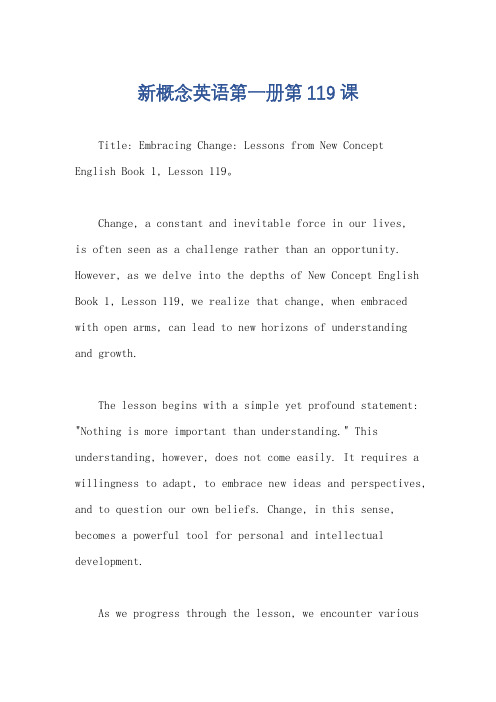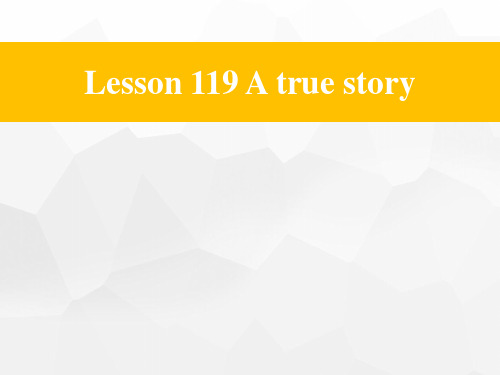新概念第一册119课
新概念英语第一册第119课(课堂PPT)

连词so,所以、因此,表示结果。 turn on,打开,拧开(电视、水源、煤气等)。其反 义词为turn off(关上)。
13
Key words&expressions
❖ 7. voice/vɒɪs/ n. voice 表示人说话时嗓子发出的声音 sound 表示世间万物的声音 noise表示杂音,不悦人的声音
14
voice noise sound ❖ 1. Don’t make any _n_o_i_s_e___! ❖ 别吵闹! ❖ 2. The girl has a beautiful _v_o_ic_e___. ❖ 那女孩嗓音很美。 ❖ 3. At midnight he heard a strange _s_o_u_n_d__. ❖ 半夜里他听到一种奇怪的声音.
21
Language points
❖ 4、While my friend, George, was reading in bed, two thieves climbed into his kitchen. George, 同位语,补充说明my friend。 climb into 爬进。
❖ 5、After they had entered the house, they went into the dining room.
故事 发生 贼 进入 黑暗的 手电筒 (说话的)声音
鹦鹉 练习本
17
Listen and answer
❖ 1. Who called out to the thieves in the dark?
新概念英语第一册Lesson119-120笔记(语法点+配套练习+答案)

12. The studentswere reading(read) English when the teacher came in.
13. Look! The monkeyis climbing(climb) the tree.
I’d like you to meet a friend ofmine(I).
enter
1.v.t.进入
=go into
2.v.t.参加
enter the army参军
3.enter for报名参加
n.entrance入口
She entered the room quiety.
她悄悄地进入屋中。
Heenteredthe universityatthe age of 21.
--- I lost my wallet.
---Whendidithappen(happen)?
--- Yesterday afternoon.
Good things always happentome.
I don’t believe that.
我不相信这事发生在他身上。
My motherhappenedtofind my keytothe front door in the garden.
他21岁上了大学。
Alotofstudentsenteredforthis competition(比赛).
很多学生报名参加这个竞赛。
dark
1.adj.黑的,暗的
2.adj.深色的
3.n.天黑
before the dark天黑以前
新概念英语第一册第119课 PPT课件

story happen thief enter dark torch voice parrot
read
n. v. n. v. adj. n. n. n.
故事 发生 贼 进入 黑暗的 手电筒 (说话的)声音 鹦鹉
单词PK
黑暗的
进入
发生
grammar
过去完成时:表示过去某个时刻之前已经完成 的动作,我们叫它“过去的过去”。
Key words&expressions
7. voice n. ①声音 in a high/ low voice
voice 表示人说话时嗓子发出的声音 sound 表示世间万物的声音 noise表示噪音
Key words&expressions
8. parrot n. 鹦鹉
By
结构:by(截止)+过去时间 截止到上个学期我已经学习了2000单词。 I had leant 2000 words by last term. 截止到上个星期我已经看了5部电影。 I had seen 5 films by last week.
1. I __C____ 900 English words by the time I was ten。
7、Suddenly, they heard a voice behind them. hear-heard- heard
Language points
8、What's up? 【口语】
= What’s wrong? = What’s the matter? 【寒暄】What’s up, man? 询问对方最近过得如何。
Video Questions on the text
新概念英语第一册第119课

新概念英语第一册第119课Title: Embracing Change: Lessons from New Concept English Book 1, Lesson 119。
Change, a constant and inevitable force in our lives,is often seen as a challenge rather than an opportunity. However, as we delve into the depths of New Concept English Book 1, Lesson 119, we realize that change, when embraced with open arms, can lead to new horizons of understanding and growth.The lesson begins with a simple yet profound statement: "Nothing is more important than understanding." This understanding, however, does not come easily. It requires a willingness to adapt, to embrace new ideas and perspectives, and to question our own beliefs. Change, in this sense, becomes a powerful tool for personal and intellectual development.As we progress through the lesson, we encounter variousscenarios that highlight the importance of adapting to change. From the simple act of moving to a new house to the more complex challenges of coping with social and technological advancements, change is constantly shaping our world. The key, as the lesson suggests, is not toresist change but to accept it as a natural part of life and use it as an opportunity for growth.One of the most striking aspects of the lesson is its emphasis on the role of attitude in dealing with change. A positive attitude, the lesson suggests, can turn even the most daunting changes into exciting opportunities. By focusing on the bright side of change, we can cultivate a mindset that is resilient and adaptive, enabling us to navigate through any challenges that come our way.Moreover, the lesson reminds us that change is not always external. Sometimes, the most significant changes occur within us, as we gain new insights, develop new skills, or simply broaden our horizons. Internal change, while often more subtle than external change, can have profound effects on our lives, shaping the way we think,feel, and act.In conclusion, New Concept English Book 1, Lesson 119 teaches us that change, while inevitable, is not something to be feared. Instead, it should be seen as an opportunity for growth and development. By embracing change with an open mind and a positive attitude, we can turn even the most challenging situations into opportunities for personal and intellectual growth. Let us, therefore, welcome change not as an enemy but as a trusted companion on our journey of life.。
(完整版)新概念英语第一册第119课课件

Key words&expressions
❖ 2. happen
❖ 1) v. 发生 ❖ What happened?
❖ 2) v. 碰巧,恰好 ❖ happen to do sth ❖ I happened to meet her on my
way home. 在回家的路上,我碰巧遇见了她。
Key words&expressions
Lesson 119
A true story
Key words&expressions
❖ dining room ❖ coin ❖ mouth ❖ swallow ❖ later ❖ toilet ❖ ring
n. n. v. adv. n. v.
饭厅 硬币 嘴 吞下 后来 厕所 响
Free talk
Key words&expressions
❖ 5. dark ❖ adj. ①黑暗的 ❖ too dark ❖ ②深色的 ❖ dark blue
Key words&expressions
❖ 6. torch n. ❖ ①手电筒 turn on/ off the torch ❖ ②火炬 torch
By
❖ 结构:by(截止)+过去时间 ❖ 截止到上个学期我已经学习了2000单词。 ❖ I had leant 2000 words by last term. ❖ 截止到上个星期我已经看了5部电影。 ❖ I had seen 5 films by last week.
❖ 1. I __C____ 900 English words by the time I was ten。
❖ story ❖ happen ❖ thief ❖ enter ❖ dark ❖ torch ❖ voice ❖ parrot
新概念英语第一册Lesson119-Lesson120(共43张PPT)

2. _g_o__in__to__=_e_n_t_e_r___意为走进.
3. ___tu_r_n__o_n___意为打开(水、电、气等). 反义词为__tu__rn__o_f_f__ 还有 _t_u_r_n__u_p_开大点 _t_u_r_n__d_o_w_n_关小点
Lesson 119 A true story
Words
1. story / stɔ: ri / n.故事
2. happen
v.发生
3. thief /θi: f / n.小偷
4.enter /
/ v.进入
5. dark /dɑ: k/ adj.黑暗的
6. torch / tɔ: tʃ/ n. 手电筒
had take
future go
now
She __h_a_d__fi_n_i_sh__ed__ the housework before she __w_e_n_t__ out. (finish, go)
had finished went
future now
We __h_a_d__h_ad_ dinner before they__a_r_r_iv_e_d_. (have, arrive)
7. voice /vɔis/ n. 指“人的声音”
8. parrot /
/ n. 鹦鹉
Words
1. story / 'stɔ: ri / 故事
a true story 真实的故事
tell sb a story 讲故事
2. happen
v.发生
sth. happen to sb. 某事发生在某人身上
新概念英语第一册第119课

10、The thieves dropped the torch and ran away as quickly as they could.
drop 扔掉;run away 逃跑; as...as sb. can/could/possible 尽可能…地(第一个as是副词, 修饰quickly,第二个as是连词,引导比较状语从句。) 例句:Run as fast as you can(后省略run)! Please write to me as soon as possible.
5. enter /'entə/ v. ①进入 enter the room 他们进入了房子后,就去了餐厅。 entered the house, they went into the After they had _______ dining room. ②参加,加入 enter the Party (入党) Four students from our school entered the final contest. 我们学校的4名学生进入了竞赛的决赛。
e.g. The film had already begun before I came back.
after + 过去完成时, 主句用一般过去时
e.g. He left the room after he had turned off the light .
模仿例句回答问题 A. 例: What was he doing while you were cooking the dinner? (work in the garden) While I was cooking the dinner, he was working in the garden. 1. What was he doing while you were cooking the dinner. (have a wash)
新概念英语第一册第119课经典课件

Key words&expressions
❖ 7. voice n.
❖ ①声音 in an angry voice
❖ ②意见 speak out my voice
❖ lose one’s voice 失音 raise one’s voice
在回家的路上,我碰巧遇见了她。
❖ I happen to know that musician . 我正好熟悉那位音乐家。
Key words&expressions
❖ 3. thief n.贼 复数:
thieves ❖ A World without Thieves
Key words&expressions
Revision
❖ 两个事件都发生在过去,强调先后顺序时, 在前发生用过去完成时表示,在后发生用 一般过去时表示。
本课当中出现before和after 引导的时间状 语从句
before+一般过去时,主句用过去完成时
e.g. The film had already begun before I came back.
嗓子变哑
提高嗓门
drop
voice 表示人说话时嗓子发出的声音 sound 表示世间万物的声音 noise表示杂音,不悦人的声音
Key words&expressions
❖ 8. parrot n. 鹦鹉
Language points
❖ 1、Do you like stories?
这里stories泛指故事这一类东西。
❖ 11、George heard the noise and came downstairs quickly.
- 1、下载文档前请自行甄别文档内容的完整性,平台不提供额外的编辑、内容补充、找答案等附加服务。
- 2、"仅部分预览"的文档,不可在线预览部分如存在完整性等问题,可反馈申请退款(可完整预览的文档不适用该条件!)。
- 3、如文档侵犯您的权益,请联系客服反馈,我们会尽快为您处理(人工客服工作时间:9:00-18:30)。
3. If something __C___ the computer, please let us know.
A. happens B.happen to C. happens to D.happens with
4. The thieves had already gone before the policemen __D__.
Key to Exercises D • 1.I went to the doctor after I had
made an appointment.
• 2. The boss left the office after he had finished work.
• 3. My wife went out after she had finished the housework.
6. What did the thieves do? They dropped the torch and ran away as quickly as they could.
7. What could George see when he came downstairs? He couldn’t see anyone.
5. They had had a crash. (用happen to 针对划线部分提问)
_W__h_a_t__h_a_d__h_a_p_p_e_n_e_d__t_o_t_h_e_m__?______________
二.单项选择
1.Don’t give up your hope no matter what_A______.
_H__o_w__f_a_r_i_s__it__f_r_o_m__B_e_i_j_in_g__t_o_N__a_n_j_in_g_?_____
3. The thieves ran away as quickly as they could. (用as soon as possible 改写为同义词)
• 5.He turned off the television. He saw the programme.
He turned off the television after he had seen the programme.
6.He went to bed. He did his home work. He went to bed after he had done his homework.
4. 放学后,她去了超市。(after)
__S_h_e__w__e_n_t_t_o__t_h_e__s_u_p_e_r_m_a_r_k_e_t__a_f_t_e_r_c_l_a_s_s_._
6. We ____ five English songs by the end of last term.
A. learned
B. have learned
C. had learned
D. will have learned
三.翻译句子
1I.我w要a告n诉t 你t一o 个te有l趣l 的yo故u事a。n(inintetreersteinsgt)ing story.
பைடு நூலகம்
A. had arrived
B. would arrive
C. have arrived
D. arrived
5. Please __C____ the radio a little. I can’t hear it
clearly.
A. turCn on
B. turn off C. turn up D. turn down
the living room.
He dropped the vase after he had taken it into the living room. • 2.He bought another car. He sold his old one.
He bought another car after he had sold his old one.
过去完成时
1.表示过去的某一时间或某一动作之前发生的事 情或完成的动作或存在的状态
2.肯定句:主语 + had + P.P.(过去分词)
否定句:主语 + had + not + P.P.(过去分词)
• I asked the price of the car, but they had already sold it.
5. What did they hear suddenly? 6. What did the thieves do? 7. What could George see when he came downstairs? 8. Who had called out in the dark?
5. What did they hear suddenly? They heard a voice behind them.
________________________________________
3.学生们尽快离开了教室。(as…as possible)
__T_h_e__s_t_u_d_e_n_t_s__g_o_t_o_u_t__o_f__t_h_e__c_la_s_s_r_o_o_m__a_s___ __q_u_i_c_k_ly__a_s__p_o_s_si_b_l_e_.______________________
• She had finished the housework before she went out.
• We had had dinner before they arrived.
Exercises A :用after连接两句话 • 1.He dropped the vase. He took it into
• I ran to the platform quickly, but the train had already left.
• He gave us our exercise books after he had corrected them.
• She went on holiday after she had taken the examination.
Questions
• 1. How long ago did this story happen? • 2. What was George doing when two
thieves climbed into his kitchen? • 3. Where did they go after they had
New words and expressions
story /’stɔ:rɪ/
n. 故事
happen /’hæ pən/
v. 发生
thief /θi:f/
n. 贼
enter /’entə/
v. 进入
dark /dɑ:k/
adj. 黑暗的
torch /tɔ:tʃ/
n. 手电筒
voice /vɔɪs/
前天发生了什么?
What happened the day before yesterday?
★ enter : go into
★ After they had entered the house, they went into the dining room.
• 他们进到屋里后,走进了饭厅。 • had entered 动作发生在前 • went into 动作发生在后
_T_h_e__t_h_i_e_v_e_s_r_a_n__a_w_a_y__q_u_i_c_k_ly__a_s__s_o_o_n_a_s__p_o_ssible.
4. They met her when they were walking on the street. (针对划线部分提问)
__W__h_e_n__d_id__t_h_e_y__m_e_e_t__h_e_r_?________________
一.按要求改写句子。
1.Be more careful with your behavior. (改为否定句)
_D__o_n_’_t__b_e__m__o_re__c_a_r_e_f_u_l_w__it_h__y_o_u_r__b_e_h_a_v_io_r_.
2. It is one thousand kilometres away from Beijing to Nanjing. (就划线部分提问)
A. happens
B. take place C. occur D. will be
2. The thieves had already gone, ___B___?
A. didn’t they
B. hadn’t they
C. didn’t the thieves
D. hadn’t the thieves
8. Who had called out in the dark? George’s parrot had.
★ It happened to a friend of mine a year
ago.
happen to sb.
发生在……身上
他昨天出什么事了?
What happened to him yesterday?
He was reading in bed.
3. Where did they go after they had entered the house?
They went into the dining room.
4. What kind of light did they have with them? They had a torch.
